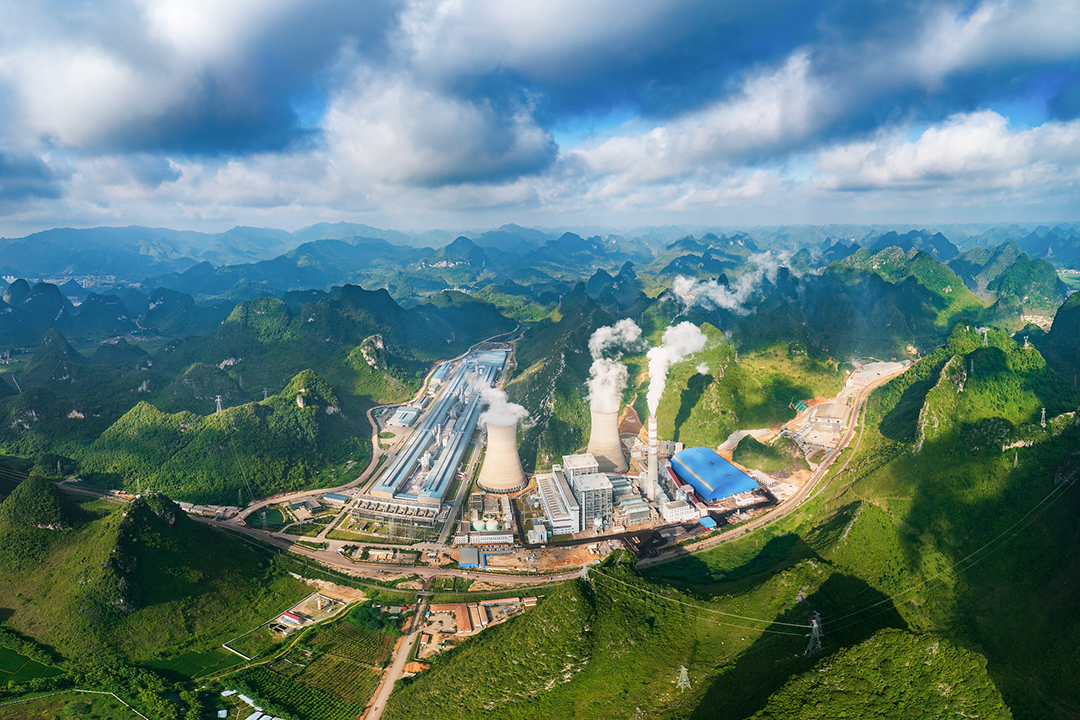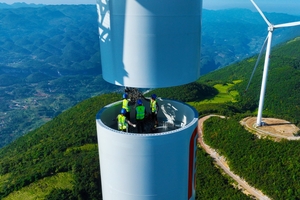Energy Insider: China Plans to Expand Its Carbon Market This Year, Green Electricity Certificates Get New Rules
Listen to the full version

In this week’s Caixin energy wrap, we analyze China’s biggest climate and energy news on policy, industry, projects and more:
• China plans carbon market expansion
• Green electricity certificates get new rules
• Energy concerns spur coal mine permits
• Another turbine giant bets on green hydrogen in Spain
• Solar giants’ shine fades amid growing glut
In focus: China plans to expand its carbon market this year

Download our app to receive breaking news alerts and read the news on the go.
Get our weekly free Must-Read newsletter.
- DIGEST HUB
- China plans to expand its national emissions trading scheme to include cement, iron, steel, and electrolytic aluminum industries, covering around 60% of national emissions annually.
- The government introduces stricter rules for green electricity certificates to prevent fraud and ensure proper utilization, aiding their renewable energy goals.
- Envision Energy Co. Ltd. will invest $1 billion in a green hydrogen industrial park in Spain, contributing to the country's renewable energy advancements.
In this week's Caixin energy wrap, key developments in China's climate and energy landscape were discussed, including the planned expansion of its carbon market, stricter rules for green electricity certificates, accelerated coal mine permitting, significant investments in green hydrogen by a major wind turbine company, and financial struggles faced by solar panel producers due to overcapacity. [para. 1]
**Carbon Market Expansion:**
China aims to incorporate three major industries—cement, iron and steel, and electrolytic aluminum—into its national emissions trading scheme (ETS) by the end of this year, as announced by the Ministry of Ecology and Environment (MEE) on September 9. With the addition of approximately 1,500 companies from these sectors, the carbon market is expected to cover around 8.1 billion tons of carbon emissions annually, equivalent to 60% of the national total. Public comments on this proposal will be accepted until September 19. This move aligns with the EU's upcoming tax on carbon-intensive imports, reflecting China's commitment to expanding its carbon market, which in 2023 covered about 40% of the nation’s emissions but saw relatively low trading volumes compared to the EU's carbon market. [para. 3]
**Green Electricity Certificates:**
The National Energy Administration (NEA) outlined new rules on September 5 to ensure the validity of green electricity certificates (GECs). To prevent misuse, all expired or used GECs must be verified and written off. The NEA's qualification center will oversee the issuance, trading, verification, and scrapping of these certificates. Additional measures include warnings for fraudulent applications and potential involvement of judicial authorities for severe infractions. This regulatory tightening aims to address loopholes and enhance the efficacy of China’s renewable energy certification program. [para. 3][para. 5]
**Coal Mine Permits:**
Over the past three years, China has accelerated the approval process for new coal mines to support energy security, according to a report by the Global Energy Monitor (GEM). The country has coal mines under development with a combined annual production capacity of 1,280 million tons, representing nearly half of the global coal-fired plants in the pipeline. Notably, Inner Mongolia, Shanxi, and Shaanxi are the leading provinces by coal-mining capacity. This surge in coal production aims to avert shortages like those experienced during the severe blackouts in Sichuan in the summer of 2021. Coal power plants had stocked 120 million tons of coal by early July, indicating a significant year-on-year increase, yet power cuts were reported in Chengdu due to extreme heat. [para. 3][para. 6]
**Green Hydrogen Investment:**
Envision Energy, the world's second-largest wind turbine maker, announced it will invest $1 billion in constructing a green hydrogen industrial park in Spain, creating 1,000 new jobs. Scheduled to begin construction in the first half of 2026, this project will involve collaboration with the Spanish government and key industry and financial leaders. This announcement follows Hygreen Energy's recent plans to establish green hydrogen production facilities in Spain, highlighting the country’s strategic position in the European green hydrogen market. [para. 3][para. 7]
**Solar Industry Challenges:**
Chinese solar panel manufacturers are experiencing financial losses due to a price war stemming from overcapacity and weak demand. Major photovoltaic (PV) producers posted substantial losses in the first half of 2024, with Longi Green Energy Technology reporting a net loss of 5.2 billion yuan ($733 million) and TCL Zhonghuan Renewable Energy over 3 billion yuan. The remaining profitable firms reported shrinking margins. Despite the financial strain, companies are compelled to continue selling to maintain cash flow, but the industry is expected to take a significant period to eliminate inefficient capacity. [para. 3][para. 8]
Contributors to the report include Luo Guoping, Zhao Xuan, Fan Ruohong, Qu Yunxu, and Han Wei. The editor responsible is Michael Bellart. [para. 3]
- Envision Energy Co. Ltd.
- Envision Energy Co. Ltd., the world's second-largest wind-turbine maker, plans to build a $1 billion green hydrogen industrial park in Spain. The project aims to create 1,000 new green jobs and will involve collaboration with the Spanish government and key industry leaders. Construction is set to start in the first half of 2026.
- Longi Green Energy Technology Co. Ltd.
- Longi Green Energy Technology Co. Ltd., China's largest solar wafer producer, reported a net loss of 5.2 billion yuan ($733 million) for the first six months of 2024. This significant loss marks a stark reversal from its profits a year earlier, as the company faces a price war triggered by overcapacity and weak demand in both domestic and overseas markets.
- TCL Zhonghuan Renewable Energy Technology Co. Ltd.
- TCL Zhonghuan Renewable Energy Technology Co. Ltd. is a major Chinese photovoltaic (PV) manufacturer that reported a net loss of over 3 billion yuan for the first six months of 2024. The company is suffering from plunging valuations and mounting losses due to a price war caused by overcapacity and weak demand in the solar-panel industry.
- Hygreen Energy
- Hygreen Energy, a Beijing-based hydrogen firm, announced plans to build new plants for producing green hydrogen and electrolyzers in Spain. This move follows Envision Energy's similar investment in Spain, positioning the country as a potential leader in green hydrogen due to its resources and market scale.
- Summer of 2021:
- Severe blackouts occurred in Sichuan due to coal supply shortages.
- First six months of 2024:
- Chinese solar-panel makers, including Longi Green Energy Technology Co. Ltd. and TCL Zhonghuan Renewable Energy Technology Co. Ltd., reported significant net losses.
- Early July 2024:
- Coal power plants in China had stocked a total of 120 million tons of coal to meet surging power demand.
- Late August 2024:
- Chengdu, the capital of Sichuan, experienced power cuts due to extreme heat increasing air conditioning usage.
- Sept. 5, 2024:
- The National Energy Administration (NEA) published new rules on the validity of green electricity certificates (GECs).
- Sept. 9, 2024:
- The Ministry of Ecology and Environment (MEE) proposed a plan to incorporate cement, iron and steel, and electrolytic aluminum industries into China's national emissions trading scheme (ETS) by the end of the year.
- Sept. 9, 2024:
- The Global Energy Monitor (GEM) reported on the acceleration of coal mine approvals in China over the past three years.
- Sept. 10, 2024:
- Envision Energy Co. Ltd. announced plans to build a $1 billion green hydrogen industrial park in Spain.
- Sept. 19, 2024:
- The MEE will accept public comments on the proposed ETS expansion plan until this date.
- By the end of 2024:
- China will incorporate cement, iron and steel, and electrolytic aluminum industries into its national emissions trading scheme (ETS).
- PODCAST
- MOST POPULAR







 Sign in with Google
Sign in with Google
 Sign in with Facebook
Sign in with Facebook
 Sign in with 财新
Sign in with 财新